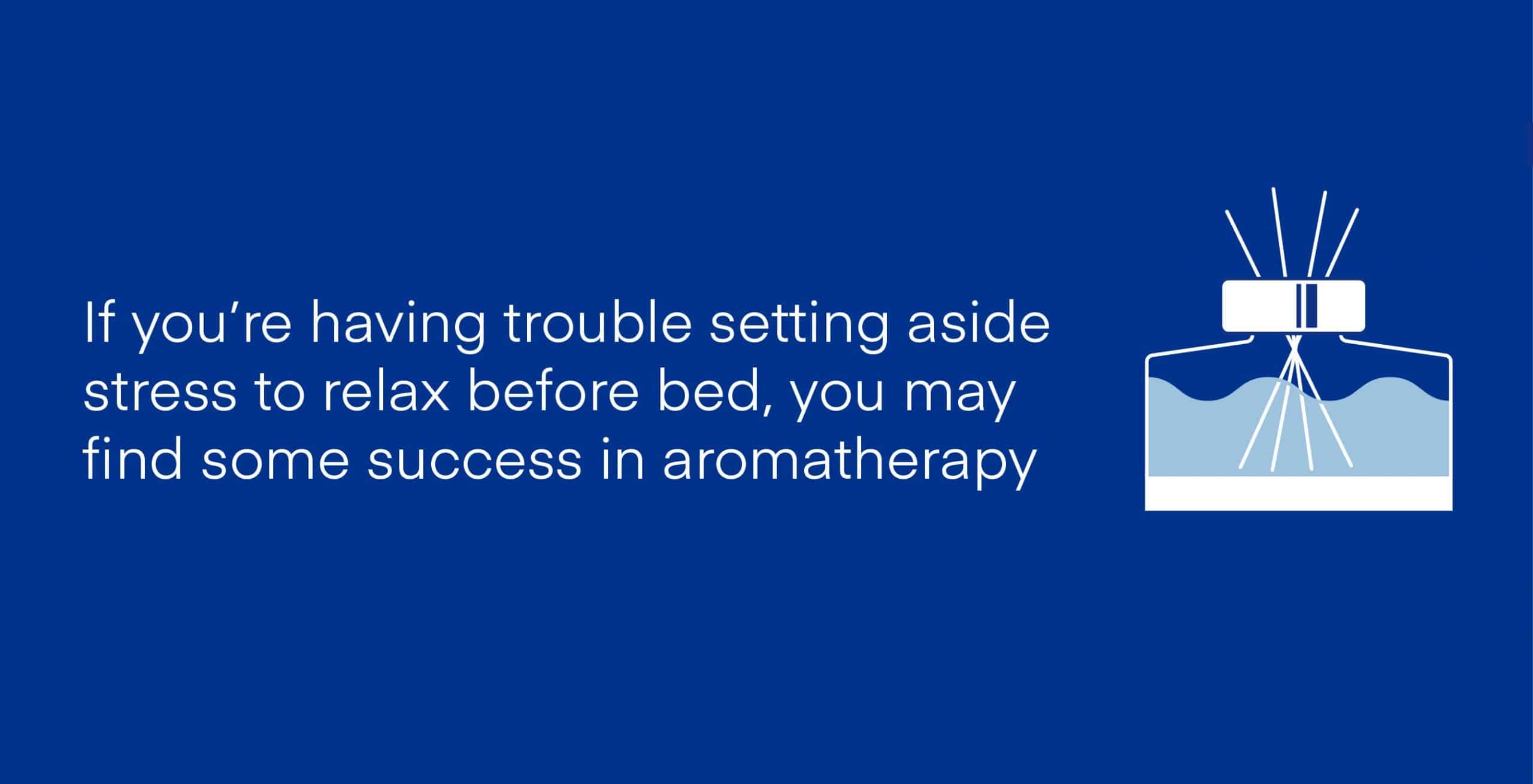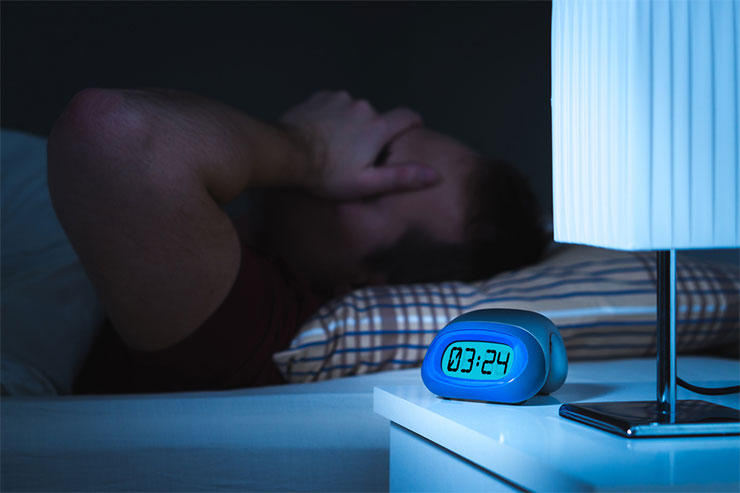If sleeping through the night feels like an impossible task, you’re not alone— the CDC says over 30 percent of adults struggle with sleeplessness. And the causes of sleep deprivation vary, as many attribute their poor sleeping habits to stress, while some blame disruptive sounds outside the bedroom, and others have to accommodate irregular sleep schedules from shift work.
When it seems like there are countless factors working against a good night’s sleep, it can be difficult to stop the tossing and turning and get peaceful rest. But don’t worry, there are simple steps you can take as soon as today to start getting better sleep tonight.
1. Turn Off Electronic Devices
First, it goes without saying, light impedes sleep. Nobody wants to fall asleep in a bright room or with a screen glaring in their eyes. There’s a real science to light hindering sleep, too.
The presence of sunlight, blue light, or really any light source, impacts your circadian rhythm (also known as your sleep-wake cycle). Your brain interprets light in your environment as a signal to stay active, and as a result, it suppresses melatonin, the sleep hormone. When there’s little to no light, or dim lights, the body produces more melatonin and prepares for sleep.
To prevent your devices from harming your sleep, we suggest turning them to Night Mode in the evenings. Or better yet, don’t use them at all 2-3 hours before bed. If you watch television before bed, turn down the brightness, and turn off any bright overhead lights in your living space. Creating a relaxing environment helps you unwind and better prepare for sleep.
2. Avoid Caffeine During the 6 to 7 Hours Before Sleep
Caffeine is a stimulant that works to keep you awake, not promote sleep. Energy drinks, soda, coffee, green tea, and other caffeinated beverages should be avoided in the afternoons and evenings—or, if you’re a shift worker, in the 6 to 7 hours leading up to bedtime—since it can stay in your system for nearly half of a day.
Look out for sneaky sources of caffeine, too, as chocolates and other sweet treats can sometimes cause an energy spike and influence your sleep at night. To play it safe, we suggest light, healthy foods and decaf beverages in the second half of your day as you prepare for sleep.
3. Set a Sleep Schedule
Another easy way to get yourself into the habit of falling asleep (and staying asleep) night after night is to set a schedule for yourself. Our circadian rhythm operates most smoothly when it follows a routine—going to bed and waking up at different times each day confuses our body and prevents us from ever establishing a real sleep schedule.
Following a strict bedtime and wake-up routine, even on the weekends and days you just want to kick back in bed, keeps your sleep-wake cycle working how it should and prevents sleep difficulties.
4. Establish a Regular Bedtime Routine
And to backpack on our last recommendation, we suggest reinforcing a regular sleep schedule with a regular bedtime routine and good sleep hygiene habits. Take the last hour or so in the evenings before bed to de-stress and prepare yourself for sleep. Put away technology, set aside thoughts of work and other responsibilities, and use this time to accomplish a few things for you and your sleep health.
Whether you prefer to take a bath and journal before bed, or squeeze in some gentle stretching and a shower, following the same bedtime routine night-after-night trains your brain to prepare for sleep at the same time every day. Eventually, you’ll be feeling drowsy and yawning before your head even hits your pillow.
5. Keep Your Bedroom Cool
Night sweats and overheating during sleep are bothersome to many, and even if you don’t struggle with night sweats, warm climates and hot bedsheets can make cool, comfy sleep a challenge. You can counter night sweats with a bedroom fan or a good A/C system—we just suggest shooting for a bedroom temperature between 60 and 67 degrees Fahrenheit. Temperatures below 54 and above 75 are too cold and too hot for sleep, but temperatures in the 60-degree range are usually just right.
6. Incorporate Foods for Sleep During Dinnertime
Just like there are foods to avoid before bedtime, there are sleep-enhancing foods you can try to help you get better rest. Turkey, salmon, leafy greens, white rice, and whole grains are all known to promote more peaceful shut-eye. Alternatively, big, heavy meals, greasy foods, and sugary desserts can cause indigestion and make sleep difficult.
To reap the benefits of these foods, we recommend planning dinners at least three hours before sleep, as this allows plenty of time for digestion. Do your best to limit late-night snacking, but if you find your stomach growling before bed, stick to light and healthy options like cheese and crackers or apple slices with peanut butter—these small bites containnutrients like tryptophan and fiber to help sleep come more easily.
7. Take a Warm Bath (or Shower) Before Bed
Showering before bed can be helpful to sleep for a couple of reasons. One, most people want to climb into bed after a long day feeling fresh and clean. Washing away the day helps you relax and prepare to drift off to sleep. Two, the act of spiking your internal temperature in a hot shower or bath actually facilitates the cool-down process necessary to fall asleep. So, if you want to fall asleep fast, jump in a hot shower and then tuck away into bed—your body will feel relaxed and your core temperature will slowly drop until the lowest point needed for deep, slow-wave sleep.
8. Use Breathable Bedding
Using breathable bedding works to keep your body temperature regulated during the night, preventing you from waking up either too hot or too cold. Cotton is a wonderful year-round fabric, as it is insulative enough to keep you cozy during cold months yet lightweight enough to prevent heat retention in the summer. That said, Tencel, linen, and bamboo are other breathable bedding options worth considering.
Of course, we suggest our Amerisleep bed sheets for sleepers, as we craft these sheets with high-quality fabrics to maintain comfort through every season.
9. Incorporate Exercise Into Your Day-to-Day
Exercising, obviously, is vital to good health, but a daily workout can also help you sleep better, too. Getting your heart pumping and body moving tires your body out and releases endorphins or “feel-good” hormones. Promoting good health with a consistent workout regimen regulates hormone production and internal processes to reduce insomnia and anxiety and bolster a healthy circadian rhythm. As a result, sleepers who use exercise to improve shut-eye drift off faster, wake up during the night less often, and all in all, sleep longer and better. Plus, exercising outside in the sun improves the natural sleep-wake cycle and helps you to feel more alert post-exercise.
10. Try Aromatherapy With Essential Oils for Sleep

If you’re having trouble setting aside stress to relax before bed, you may find some success in aromatherapy. Diffusing essential oils for sleep in your bedroom or living area fills the room with peaceful scents and puts you in the headspace to chill out and calm down. Certain scents, like lavender and jasmine, are thought to be better for sleep than others, but you can try a variety of essential oils for sleep and mix up scents as you go.
11. Practice Light Stretching Before Bed
Another way to distract yourself from the stress of being unable to fall asleep and focus your energies on preparing for bedtime is to incorporate a gentle stretching routine into your evenings. Even just five minutes of light stretching can activate the parasympathetic nervous system (a.k.a. the rest and digest functions) and limit cortisol (also known as the stress hormone) production, and this ultimately prepares your mind and body for rest.
12. Limit Daytime Naps
It’s probably a no-brainer that daytime naps can limit nighttime sleep, so if you’re a napper and you struggle to get good sleep at night, the first step is to cut the daytime sleep. And, if you really need to take a quick break to snooze mid-day, plan your naps six or seven hours before sleep and limit them to 20 or 30 minutes. Earlier power naps have less impact on your sleep at night, but ideally, they should be avoided while you’re working to improve your nighttime sleep routine.
13. Consider Your Mattress and Pillow
Lastly, consider the mattress and pillow you’re using and whether they’re helping you get good sleep or making comfortable rest harder. Your mattress shouldn’t feel lumpy or cause sinkage, but instead, support you in a healthy position and ease pressure points. Likewise, a good pillow supports your neck in a straight position and prevents kinks and pains.
If your current mattress or pillow isn’t cutting it in terms of comfort, you’re better off investing in a new, more compatible sleep system than frustrating yourself with alternative sleep remedies. To compare top mattresses and upgrade to the best bed for your sleep needs, check out our best mattress buyer’s guide.
